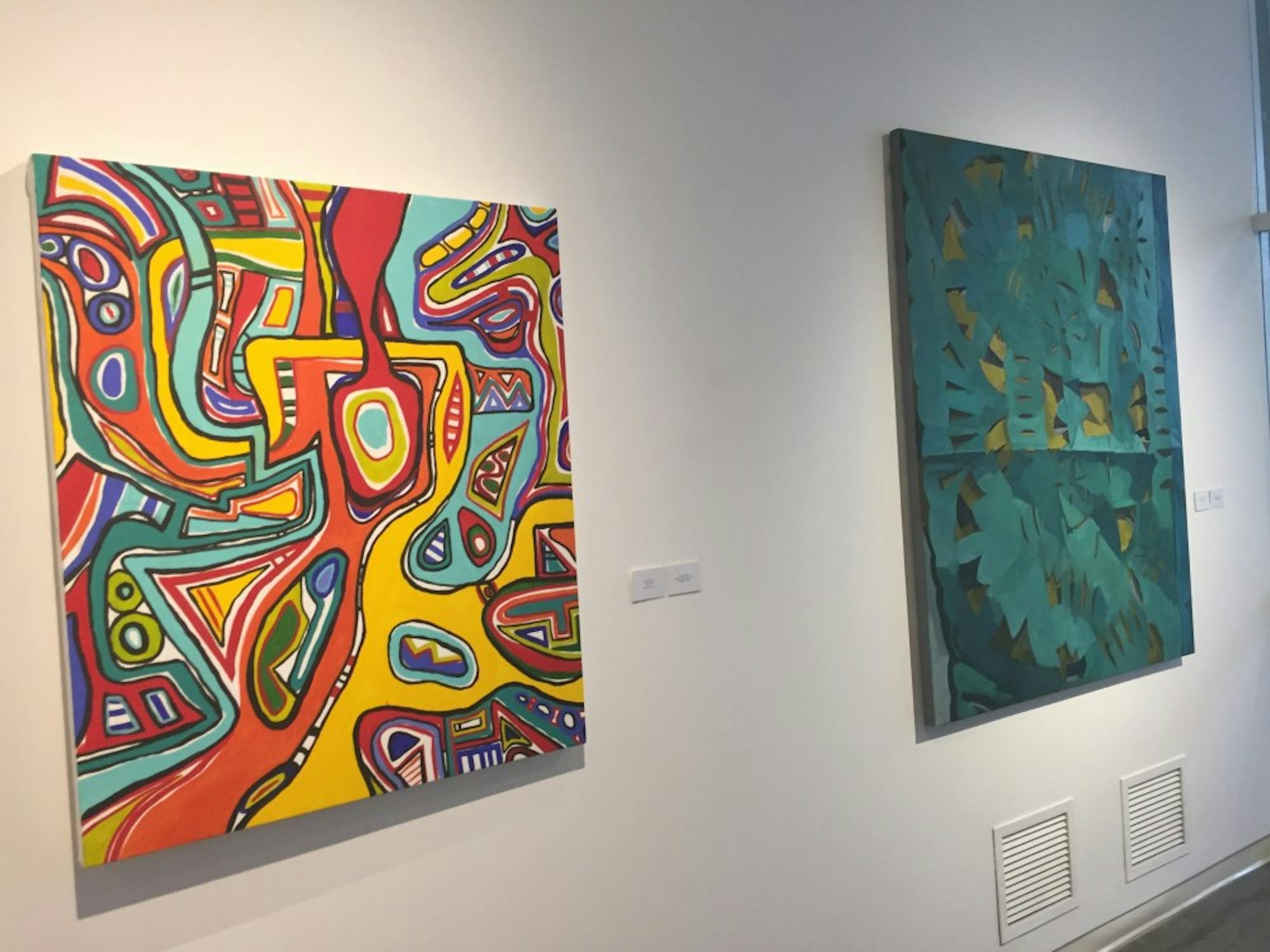This article is featured in the 2017 Commencement & Reunions Issue.
In the culmination of over 500 hours of work per student, each year the studio art department sponsors a curated exhibition of all the senior art majors’ most polished and powerful pieces. This year, the exhibit features a diverse showing of mediums, from painting to charcoal to digital media. Nineteen seniors have their art featured in the Jaffe-Friede and Strauss Galleries in the Hopkins Center for the Arts as well as in the Nearburg Art Forum in the Black Family Visual Arts Center from May 16 to June 18.
Students who participated in the exhibit were enrolled in a senior seminar offered by the studio art department for two consecutive terms, giving them the opportunity to bond with the other artists who shared their studio space and worked through the class with them.
Moriah Morton ’17, whose colorful paintings and sculptures are featured in the exhibit, spoke to the bonds that were formed with her peers as a result of going through this experience together.
“Usually in an art class, there are people of really varying interests, some who want to be professional artists and some who don’t care much at all and are just doing it for a [distributive requirement] or something,” Morton said. “It was really cool to have everyone be on the same passion level and interest level.”
In addition, students were able to offer feedback and assistance to their neighbors as they worked. Anthony Chicaiza ’17 noted the constant exchange of ideas facilitated by the close studio space.
“Some of your work ends up taking on characteristics of your neighbors,” Chicaiza said. “I concentrated in illustration and drawing, but I didn’t really know very much about printmaking until I asked another student about it, and we were able to go to the studio together and talk about that together and learn more about each other as we went along.”
In order to meet the deadline for submitting their work for the exhibit, most students had to put in 20 to 30 hours a week over the course of two terms. This Herculean effort, too, brought the senior majors together as a group.
“I think people vibe off each other and get encouraged when everyone collectively is in the studio at 4 a.m. instead of just them by themselves,” Morton said.
While each student has only three pieces in the exhibit, the body of work created over the course of the year is quite extensive. The format of the class gives students the opportunity to pursue various interests, while focusing on one central theme that draws all of their work together. Morton focused on colorful and energetic paintings and sculptures that reflected her proclivity for playfulness and human interaction. Chicaiza’s final project took the form of a graphic novel in which he deconstructed the idea of the superhero through the idea of mental illness. Both artists concentrated in mediums in the fine arts, but there were also many senior majors who explored digital media in their projects. Kelsey Phares ’17 is one senior major who explored many elements of digital design in her work but admitted there were challenges.
“It’s been hard learning all of these different concepts without anyone to really lead you,” Phares said. “Because the department is mainly fine arts based, but I feel like it’s been worthwhile. I think it would be great if it was something that more artists were introduced to.”
Phares’ work included found video footage as well as digital manipulation on various photographs. In addition, her work, like all the other senior majors’ work, is for sale as part of the exhibition. As part of an ongoing partnership, the Office of Residential Life has purchased a piece from each student, and the artwork will eventually be placed in various residential living spaces on campus. In addition, alumni classes have also purchased some of the works of art, and these pieces will be displayed at Reunions with the possibility of other people deciding to purchase them.
Morton emphasized the extraordinariness of having her work showcased for such a wide audience.
“It’s really cool to have our art in a space that kids walk through every day,” Morton said. “That’s been one of the most exciting parts, for people to showcase to people who haven’t seen it before.”
Because of the showcased aspect of the exhibition, professors in the department are very strict about making sure all pieces are of a caliber befitting a real curated art show. The professors who guided them through this process, many of the students said, were incredibly influential in helping them complete their work on time and to the best of their ability.
The close-knit community and the amount of effort that goes into completing the experience gave students a special appreciation for the magnitude of what they have accomplished. Phares pointed out the unique power of the art she has created over the course of this year.
“A lot of people, especially outside of Dartmouth, judge us for being Studio Art majors, like, ‘Great, you did nothing with your college career,’” Phares said. “But one of the things I’ve realized is that every time I have an assignment, I have something I can bring home; I have something I can be proud of.”
This exhibit marks the culminating experience in the art department for the senior majors. After graduation, some of them plan to pursue art while others are also exploring other options for their future careers. One feature that unites them, though, is a creative ability to put their dreams into action.
“Right now it’s kind of open ended, but I have definite paths that I want,” Chicaiza said. “Now the question becomes, how do I get there?”




